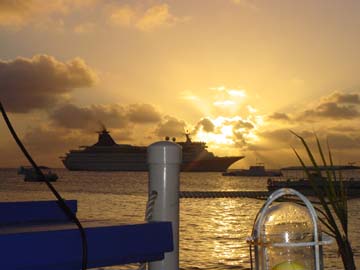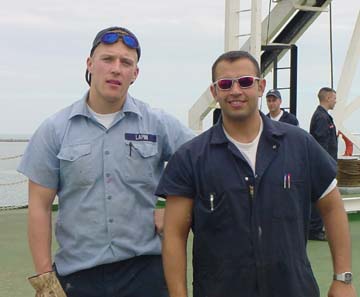
| February 2002 | ||||||
| Sun | Mon | Tue | Wed | Thu | Fri | Sat |
| 1 | 2 | |||||
| 3 | 4 | 5 | 6 | 7 | 8 | 9 |
| 10 | 11 | 12 | 13 | 14 | 15 | 16 |
| 17 | 18 | 19 | 20 | 21 | 22 | 23 |
| 24 | 25 | 26 | 27 | 28 | ||
Friday 08 February 2002
At 1200, EST the Training Ship Empire State was moored starboard side to pier three in Ponce, Puerto Rico. The sky was clear with east northeast winds blowing at 11 mph, air temperature was 85 degrees Fahrenheit, humidity was 70%, barometric pressure was 30.13 inches of mercury and steady.

CAPTAIN'S LOG
"Some laws of state aimed at curbing crime are even more criminal."
Friedrich Engels (1820-1895) German philosopher
We're here, safely ensconced in Ponce. But as you know, the great Hispanolia sailboat incident destroyed our carefully scripted schedule and forced overwrought cadets to revise their "perfect" voyage plans. Unforeseen delays are an integral part of the ocean shipping business and so is recovery. The ever thrifty cadets decided to minimize the delay and maximize liberty but at the cost of fuel; they poured on the coal. They had the boilers huffing to push this grand 'ole gal along at breakneck speed, (17.8 knots) nearly twice that planned for this leg but we recovered nicely and arrived at dusk. The Pilot boarded at 1834 and less than an hour later, we were tied up and finished with engines. We anticipated the usual friendly chat with Customs followed by a cordial dinner but that plan was soon hard aground, too.
When we reenter the United States or Territories, we must clear customs. While the process is somewhat more complex than clearing one traveler and searching one suitcase, the procedures are nearly identical. All have seen the customs folks at airports randomly pick unfortunate passengers from the crowds and dismantle their possessions. And, just as the occasional traveler is picked for special attention, so is the infrequent ship.
The Inspection Team arrived in force, three Immigration and Naturalization Service Agents, three Customs Agents, two Department of Agriculture Inspectors, a handler and his highly trained dog. They announced that we were the lucky, randomly picked "winners" and they were the designated "prize patrol" ready to proudly deliver our major award, one "extraordinarly detailed customs inspection and contraband search" courteousy of Uncle Sam, no less. Then they quietly and efficiently set upon us. No deck plate was left unturned and no good deed unpunished. The INS and Customs Agents carefully inspected every passport, double checked each serial number, and systematically and purposefully held each of the ship's documents to the light and verified watermark authenticity. The Agriculture Inspectors were just as thorough. They swept the ship from stem to stern; room to room they went digging for any type of sequestered contraband while the puppy happily sniffed locker to locker, and ruled out illegal drugs or explosives. The operation impressed most of our cadets, particularly the IMB majors. The inspection process is a huge (expensive) part of international business and they are seeing first hand the importance of having required documentation in order and of knowing everything that is aboard. The "surprise-prize" ruined dinner, cancelled sleep, and presented a few minor administrative problems to fix this morning (when other things are planned). We are going to be especially busy today with press conferences, tours, required visits, and relentless paperwork so please forgive me for being so brief. But I really must write and run. See you tomorrow!
CADET'S COMMENT
 The New International Maritime Business (IMB) Major, By Cadet 1/C Joe Paulis (Division 1 Leader)
The New International Maritime Business (IMB) Major, By Cadet 1/C Joe Paulis (Division 1 Leader)
From a Division Leader's perspective, the IMB Students are in an awkward position; they do not desire the sea faring life, but rather most want to work shore side. Yet, they find themselves aboard the Training Ship Empire State (TSES) chipping, painting, and sweeping with the rest of us while also taking shipboard orientation and business classes. It begs the question, "Why should I go on Sea Term? I'm a Business Major!" and I heard that statement made in the beginning. The reason for this journey is simple; it gives each IMB student insight into the daily inner workings of vessels at sea, missing at other business colleges. Not only will MMA's IMB students become sound businesspersons, but they will be versed in the vernacular of mariners. In my eyes, that is good business!
International Maritime Business Sea Term, By Cadet 1/C Barnaby Bosanquet,(MSEP)
International Maritime Business (IMB) is the newest academic degree program offered at Massachusetts Maritime Academy. IMB is a deviation from the traditional maritime education as graduates do not seek licensure as ship's officers. Graduates receive a bachelor of science degree with special focus on support and administration of ocean commerce. That predisposes them to shore-side work. A large part of the "Maritime" in International Maritime Business, takes place aboard the training ship during two, six-week semesters at sea. The current semester is the first shipboard IMB course offered and the majority of the enrollees are members of the class of 2004, the first to declare the new major as freshmen. The IMB sea term program consists of courses in personnel management, marine occupational safety taught at sea, and field activities and tours when the ship is docked. The total experience culminates with the successful completion of the six credit course and a federal safety certificate. Labs include, fire fighting equipment, hazardous waste decontamination, and human toxicity.
One major advantage that the IMB students enjoy, is the large number of experts who are aboard and willingly share their knowledge. For example, Captain Tom Bushy, Master of the training ship, took time from his busy schedule to teach a class on international load lines and vessel logistics.
Students are offered opportunities to meet with port facilities managers and to witness maritime commerce in progress. While in Norfolk, VA, students took an interesting, educational tour of the Virginia Port Authority, one of the most technologically advanced cargo facilities in the world and the class is looking forward to other interesting offerings at Ponce, Puerto Rico, and Fort Lauderdale, Florida.
On a more personal note, my classmates' experience in the first course seems to be a very positive one despite the loss of CDR J. MacDonald, an excellent professor, who had to return home unexpectedly.
Then, we find ourselves defending our place here with our sea going shipmates.(tradition) We are the largest group of non-license track "beach-huggers" on board. Things will ultimately work out in our favor; "Holding our own" with this group is good exercise, we'll need the skills to survive the first few years as young managers in the field. Overall, the IMB program is going well. Hard work seems to be paying off with success, both for declared cadets and for the seven who are taking this course as an elective. All 25 will have something to be proud of and to share with all of you in less than three weeks.. when we get through.
ANSWERS FOR FRIDAY 08 FEBRUARY
MATH:
1/2 + 1/4 + 1/6 = 6/12 + 3/12 = 2/12 = 11/12
That leaves 1/12 for Buzzards Bay.
1/12 of his money is $80.00
12 x $80.00 = $960.00
or use algebra
1/12 (n) = 80
(12) x 1/12(n) = 80 x (12) n = $960.00 for the Sea Term
SCIENCE:
p(potential of) H (hydrogen), is a measure of the acidity or alkalinity of a solution. The number 7 is neutral; larger numbers are more alkaline; lesser numbers are more acidic.
GEOGRAPHY:
The far western point of Cuba is called Cape San Antonio.
HISTORY:
Marcus Garvey, 1887-1940, was born in Jamaica. He established the Universal Negro Improvement Association in 1914. Its goals were "to foster worldwide unity among all blacks and to establish the greatness of the African heritage."